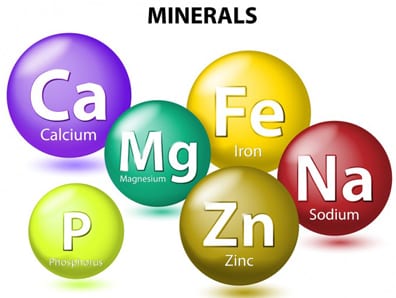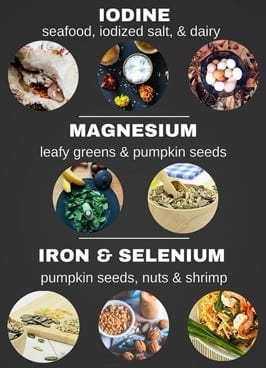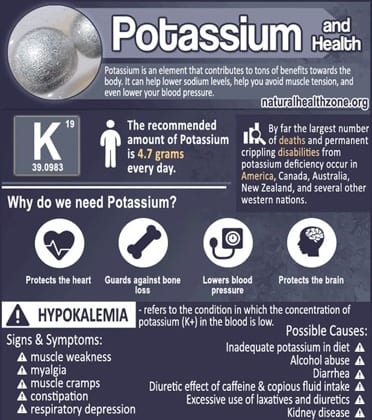Essential Minerals For Better Health

What are the essential minerals?
Essential Minerals
A mineral is a chemical element required as an essential nutrient by organisms to perform functions necessary for life.
Some minerals help your cells perform chemical reactions, while others build up your bones or blood. Some minerals work together to make your muscles function properly or to transport oxygen throughout your bloodstream, so an adequate mineral intake helps to keep your whole body running efficiently.
Certain definitions are found below post:
What Are These Minerals And Why We Need Them:
Your bones are made of a crystal called hydroxyapatite, which is composed of calcium and phosphate. Calcium is such an essential component of your blood and soft tissue that if you don’t have enough of it circulating in your blood, your body takes it out of your bones and puts it into your bloodstream, weakening your bones.
Calcium is the most important macromineral for healthy bones. You need bones to move, and they also provide your body with structure and protect your internal organs. You also need calcium for dental health. Dairy products are rich sources of calcium, as are broccoli, spinach, arugula, and kale. Some foods also have added calcium, such as juices, soy milk, and cereals.
The Institute of Medicine recommends getting 800 to 1,000 milligrams of calcium per day to supply your body with all the calcium it needs.
Iron promotes proper growth, metabolism, DNA synthesis, immunity, and healing. It is an ingredient in the proteins hemoglobin and myoglobin, which carry oxygen throughout your blood and muscles. Your body absorbs heme iron, found in animal-based sources such as meat, more easily than non-heme iron, which comes from plant sources, such as spinach or lima beans. Eating vitamin C-rich food with a non-heme iron source optimizes your body’s ability to absorb plant sources of iron.
Iron transports oxygen throughout your body. It is also needed to make hemoglobin, which is the part of the red blood cell that carries oxygen. Meat, fish, beans, eggs, and leafy greens are good sources of iron.
Copper facilitates wound healing, gives your cells energy, and benefits your immune system and nervous system. The IOM recommends that adults get 700 micrograms of copper per day, but it is important to get the right balance of copper and zinc, as an excess of one can cause a deficiency of the other.
Copper is needed in only very small amounts. This trace mineral is necessary for the oxidation of iron before it transports oxygen in your blood. Cashews, sunflower seeds, and black-eyed peas can help you meet your copper needs.
Women need 6.8 milligrams of zinc daily and men need 9.4 milligrams. Zinc also benefits your immune system helps your cells divide properly, and promotes a proper sense of smell and taste.
Most of the magnesium in your body is in your bones and muscles, but some are in other tissues and fluids. Magnesium helps your body form protein, replicate cells, and produce energy, and it works with calcium to enable you to contract your muscles. It helps regulate your blood pressure and improve your heart function.
Magnesium is found both in your bones and muscles. It supports the formation of proteins and fatty acids. Magnesium also serves as a cofactor for more than 300 enzymes. Cashews, halibut, and spinach can help you meet your magnesium needs.
Your body requires magnesium to make bones, muscle, and other cells. Typically, an adult body has around 25 grams of magnesium at one time, 99 percent of which is in the structure of cells like muscle cells. Magnesium is a component of chlorophyll, the substance that gives plants their green color, including green leafy vegetables, which are rich in magnesium. Nuts and unrefined grains are also good sources of magnesium. Meat and milk products contain magnesium, too, but less than vegetables, nuts, and grains.
Women should get 265 milligrams of magnesium per day and men should get 350.
Every cell in your body needs phosphorus to function normally, as it interacts with other minerals to help your body produce and store energy and maintain a normal acid-base balance. About 85 percent of the phosphorus in your body is within your bones, according to the Linus Pauling Institute.
580 milligrams a day, an easy task for those who eat meat and dairy products, but vegans may benefit from taking supplements containing this mineral.
Sodium aids in the contraction of your muscles and the conduction of nerve impulses. Sodium is also important for fluid balance. Unfortunately, most Americans get more sodium in their diet than they need. A high intake of sodium increases both blood pressure and the risk of heart disease.
Sodium is a key mineral your body needs to control blood pressure and blood volume. Nerves and muscles also need sodium to function correctly. Most foods contain some sodium. Table salt contains sodium chloride, the most common form of sodium, according to the University of Maryland Medical Center. The UMMC also states that celery, beets, and milk all have sodium naturally. Many foods have added sodium, including processed meats and canned soups and vegetables. Typically, fast foods contain high levels of sodium.
Sulfur:
The mineral sulfur is found in every protein in your body but is concentrated in the keratin of your skin, hair, and nails. Chicken, fish, and broccoli are good sources of sulfur.
Sulfur is a macromineral found in food as methylsulfonylmethane or MSM. Fruits and vegetables are sources of natural MSM. Milk, eggs, meat, some grains, and fish also contain sulfur as MSM. Your body uses MSM to make connective tissue, such as cartilage. MSM also may help decrease pain by slowing nerve impulses that send out pain signals.
You need iodine to make thyroid hormones, which control your metabolic rate. Seafood, specifically saltwater fish, is your best source of iodine. Iodized salt helps most Americans meet their daily iodine needs, according to Mahan and Escott-Stump.
You only need it in small amounts, but it is essential for life. Selenium is necessary for reproduction and the synthesis of DNA. It is also an antioxidant that may protect you against cancer, according to the Office of Dietary Supplements. Sources include Brazil nuts, yellowfin tuna, and cottage cheese.
Manganese has a number of functions in your body, including enzymatic reactions, the formation of tissue, growth, and reproduction, as well as the metabolism of carbohydrates and fats. Whole grains, beans, and tea are your best sources of manganese.
Zinc:
You need adequate intakes of zinc to support immune health and fight infection. It also helps your body heal cuts. Good food sources include beef, chicken, nuts, and beans.
Asparagus is one of the leading vegetable sources of folic acid. Folic acid helps the body form red blood cells and genetic material. It also is necessary for protein metabolism, cell growth, and division, and the prevention of certain neural tube birth defects. A 1/2 cup serving of asparagus contains 132 mcg of folic acid, which is 33 percent of your daily folic acid needs.
Chloride:
Chloride is an electrolyte that works with sodium, potassium, and carbon dioxide to maintain the acid-base balance in your body and to keep the proper balance of body fluids states MedlinePlus. Elevated chloride levels may indicate the presence of conditions such as dehydration or respiratory alkalosis. Low levels of chloride can be caused by conditions such as Addison’s disease, congestive heart failure, and vomiting. Dietary sources of chloride include table salt or sea salt, tomatoes, celery, olives, and seaweed. The recommended daily requirement varies with age, gender, and health status.
Chloride is an important component of digestive juices. Your body needs chloride to maintain the correct balance of bodily fluids. Celery, lettuce, tomatoes, olives, and rye are rich in chloride. Tablet salt and sea salt also contain this macromineral. Many salt substitutes include chloride as well. According to the University of Maryland Medical Center, most people in the United States eat more chloride than necessary just from using table salt.
Potassium:
Important for maintaining blood pressure, nerves, muscles, and bones. It works in conjunction with sodium to balance electrolytes in the body. Like men, women over 19 years old need 4,700 milligrams of potassium per day; pregnant women also need this amount. Women who are breastfeeding need 5,100 milligrams per day. You can get potassium by consuming unprocessed foods such as red meat, fish, poultry, milk, nuts, seeds, and beans.
Asparagus is a rich source of potassium. Six asparagus spears contain approximately 20 mg of potassium, which is half of the potassium you need in a day. Potassium is necessary for the proper functioning of the heart, kidneys, muscles, nerves, and digestive system.
Potassium is essential for maintaining the correct water amount in blood and body tissues, like a muscle. It also helps keep your nervous system functioning correctly. Sources of potassium include citrus fruits, bananas, dried fruits, and leafy green vegetables. Peas, lentils, beans, and other legumes contain potassium, too. You get potassium from potatoes if you eat them with the skin on. According to the Harvard School of Public Health, most people in the United States eat too much sodium and too little potassium, which elevates the risk of heart disease and death. Eating a lot of fresh produce and low amounts of processed, sodium-containing foods helps to maintain the correct balance of sodium and potassium.
Lack of Potassium has been linked to increasing the risks of diseases such as high blood pressure, osteoporosis, and kidney stones.
Definitions:
Hydroxyapatite:
An inorganic calcium-containing constituent of bone matrix and teeth imparts rigidity to these structures. Synthetic compounds with similar structures are used as calcium supplements and prosthetic aids
Macromineral:
Any mineral(s) in your diet that has relatively large amounts of, especially calcium, iron, magnesium, phosphorus, potassium, and zinc.
Myoglobin:
Myoglobin is the primary oxygen-carrying pigment of muscle tissues.
Alkalosis:
 Iodine, Magnesium, Iron, Selenium
Iodine, Magnesium, Iron, Selenium



Some mineral Pins / Images and information at:
Thank you for reading.
Comments are welcome
Thank you,
Michael
Wow. You provided me with so many valuable information in this post. I actually enjoyed it from beginning untill the end. I knew essential minerals were important but I had no idea they were that important. Because I do not eat the most healthy food I use supplements for providing me with the minerals I need.
I had most trouble with magnezium. I had cramps and only when I started using magnezium, those cramps went away.
Loved the article. I am bookmarking your website.
Strahinja.
Hi Strahinja,
Thank you for your comments. Much appreciated.
I am glad the use of magnesium helped with your stomach cramps.
Using a supplement which includes the major minerals is a great idea. I also suggest any mineral should be taken with food.
Thank you,
Michael
Thanks for explaining in detail the essential minerals that we ought to have. On the other hand, I think we should not over consume any of these minerals but rather, get a small amount of each on a daily basis. Can you suggest me of a formulation either in tablet or liquid that helps in maintaining a balanced supply of each mineral every day?
Hi Gomer,
Thank you for your comments. Much appreciated.
If you go to your local health food store, or pharmacy, try finding the essential minerals as a supplement to your diet and do take them with food. Some of these minerals like Zinc may cause heartburn if taken on an empty stomach.
Calcium, Magnesium, Potassium, Chlorine, and Sodium. The micronutrient minerals
include,Copper, Iodine, Iron, Manganese, Selenium, Zinc, Fluorine.
The micronutrient minerals are found in most foods we eat.
I personally take a supplement that contains, magnesium, calcium, manganese, iron and zinc.
Wishing you all the best,
Live well,
Michael